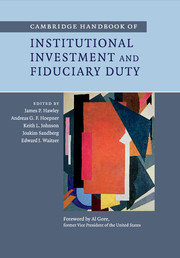Book contents
- Frontmatter
- Contents
- List of figures
- List of tables
- List of contributors
- Foreword
- 1 Introduction
- Part I Fiduciary duty: a global outlook
- Part II Fiduciary duty and the landscape of institutional investment
- Part III Challenging conventional wisdom on fiduciary duty
- Part IV Towards a broader interpretation of fiduciary duty
- 20 Fiduciary duty and the search for a shared conception of sustainable investment
- 21 Pension fund fiduciary duty and its impacts on sustainable investing
- 22 Reason, rationality and fiduciary duty
- 23 Socially responsible investment and the conceptual limits of fiduciary duty
- 24 Fiduciary duty at the intersection of business and society
- 25 Challenging conventional wisdom: the role of investment tools, investment beliefs and industry conventions in changing our interpretation of fiduciary duty
- Part V Beneficiaries’ roles and viewpoints
- Part VI Fiduciary duty and governance
- Index
- References
24 - Fiduciary duty at the intersection of business and society
Published online by Cambridge University Press: 05 April 2014
- Frontmatter
- Contents
- List of figures
- List of tables
- List of contributors
- Foreword
- 1 Introduction
- Part I Fiduciary duty: a global outlook
- Part II Fiduciary duty and the landscape of institutional investment
- Part III Challenging conventional wisdom on fiduciary duty
- Part IV Towards a broader interpretation of fiduciary duty
- 20 Fiduciary duty and the search for a shared conception of sustainable investment
- 21 Pension fund fiduciary duty and its impacts on sustainable investing
- 22 Reason, rationality and fiduciary duty
- 23 Socially responsible investment and the conceptual limits of fiduciary duty
- 24 Fiduciary duty at the intersection of business and society
- 25 Challenging conventional wisdom: the role of investment tools, investment beliefs and industry conventions in changing our interpretation of fiduciary duty
- Part V Beneficiaries’ roles and viewpoints
- Part VI Fiduciary duty and governance
- Index
- References
Summary
Introduction
Like a Rorschach drawing, views about the “business and society perspective” on the fiduciary duty of institutional investors appear to be in the eye of the beholder. Since the Aspen Institute is known for its transformative dialogues through the convening of strange bedfellows, the author sought to mirror how the Aspen Institute works, selectively crowdsourcing a quilt of views. In so doing, the author interviewed sixteen people with deep experience in the capital markets, including “insiders” who live the day-to-day of what it means to be a fiduciary and who reside in Asia, Europe and North America. The resulting interviews illuminated a range of perspectives, which seem to demonstrate that broader societal expectations of institutional investors around the world are increasing, although at different speeds – and these societal expectations may not yet be construed as legal duty.
When asked to reflect on what the subject of this book chapter means to them or their organizations, most experts began by deconstructing the component parts – “business and society” and “fiduciary duty.” A few experts sought to broaden the frame in which the question was asked and argued that understanding must begin first with context, a context understood philosophically or pragmatically. In this chapter, we will present the highlights of what was shared by the interviewees and:
consider how one’s framing significantly affects the response;
see how a “business and society perspective” can be implemented practically by institutional investors; and finally
note where there may be room for change and where there are open questions.
- Type
- Chapter
- Information
- Publisher: Cambridge University PressPrint publication year: 2014
References
- 1
- Cited by



